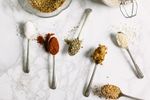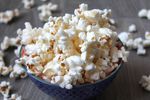It goes without saying that one of the greatest hallmarks of the holiday season is the food. Thanksgiving and beyond usually mean a feast consisting of turkey, ham, mashed potatoes, sides galore, pumpkin and apple pies and more — but the uncomfortable bloating that can follow dinner isn’t quite as pleasant.
Luckily, there’s a balance to be struck… and it doesn’t require passing on the pie. Instead, it’s about eating with intention.
“You can definitely be full and not be bloated,” says Lauren Burkowski, CNS, a Health Coach at THE WELL New York. “It’s a matter of consuming foods that agree with your body, optimizing digestion and eating mindfully.”
If you're wondering how to reduce bloating while still enjoying the season's celebratory feasts, read on for tips from the experts.
What Causes Bloating?
First, what exactly is that bloating feeling — and what causes it? “Bloat is a buildup of gas in the abdomen, usually caused during the digestive process or by swallowed air,” says Keri Glassman, registered dietitian, author and CEO of Nutritious Life. "That distended feeling can be the result of an overgrowth of bacteria in the small intestine that ferments food, creating gas.”
Both Glassman and Burkowski offered several reasons for this uncomfortable feeling.
- The amount of food you eat
- Your dietary needs
- How speedily you chew and swallow
- Hormonal imbalances
- Food sensitivities
- Digestive issues, including motility, dysbiosis and low stomach acid
RELATED: Decoding Your Digestion
How to Avoid Bloating Before and After a Big Meal
The battle against bloat begins Thanksgiving morning — and according to Glassman, it doesn’t involve the strategies you might normally rely on.
“Many people may think it’s healthier to skip breakfast and lunch on Thanksgiving day in order to make room for the big holiday meal,” says Glassman. “I always recommend eating a nutritious breakfast to keep your metabolism working efficiently. Start the day with a meal that includes protein, a healthy fat and fiber to help control your blood sugar and help you stay satisfied.”
Glassman’s go-to: “I love scrambled eggs with a side of sliced avocado and a cup of berries.”
Both Glassman and Burkowski also urge you to stay hydrated — and what you sip can make all the difference.
“Having a glass of lemon water in the morning or adding a teaspoon of apple cider vinegar to a little water up to 10 minutes before meals can help with digestion and decrease the chance of bloating,” says Burkowski.
“Staying hydrated decreases bloat and keeps your energy up,” says Glassman. “A morning cup of green tea in addition to your water and lemon at breakfast is a good way to stay hydrated.”
Probiotics are another bloat-reducing staple, and they can come in many forms. “I recommend taking probiotics to make sure your digestive system is functioning at its best,” says Glassman. “Eat foods like kimchi or take a probiotic supplement or beverage. I personally love HUZZAH (a probiotic seltzer) because it’s low-sugar and easy to drink alongside a meal, for optimal gut health.”
After dinner, Glassman recommends you get moving. “Go for a family walk,” she suggests. “Also, try an abdomen massage. Start by laying on your back. Rub in circular motions on each side of your ribcage and down your left hip bone and up your stomach.”
RELATED: Why You Should Add a Stomach Massage to Your Morning Routine
How to Portion Your Holiday Plate
Though it might be tempting to pile your plate with a sweet potato tower, proper portions can thwart the icky bloated feeling later.
“One good trick: Put protein and veggies on your plate first,” says Burkowski. “Think of a protein portion as the size of your palm and aim for vegetables making up half of your plate. From there, add the more ‘indulgent’ foods, like the stuffing or the sweets. This way, you’re filling up on the nutrient-rich things first, but you're still able to enjoy the other, less nutritious foods, too.”
Glassman also urges you to get to know your body and its needs a bit better, not just for Thanksgiving Day, but in general.
“I always tell people to get in touch with your hunger quotient,” she says “If you learn to use this and eat when you are slightly hungry and stop eating when you are slightly satisfied then you will never overeat — at least not too dramatically.”
RELATED: 11 Ways to Banish Bloat




